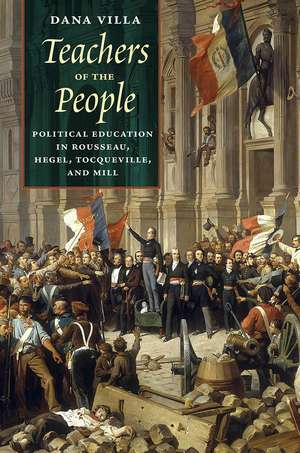Teachers of the People: Political Education in Rousseau, Hegel, Tocqueville, and Mill
Autor Dana Villaen Limba Engleză Paperback – 28 feb 2019
2016 witnessed an unprecedented shock to political elites in both Europe and America. Populism was on the march, fueled by a substantial ignorance of, or contempt for, the norms, practices, and institutions of liberal democracy. It is not surprising that observers on the left and right have called for renewed efforts at civic education. For liberal democracy to survive, they argue, a form of political education aimed at “the people” is clearly imperative.
In Teachers of the People, Dana Villa takes us back to the moment in history when “the people” first appeared on the stage of modern European politics. That moment—the era just before and after the French Revolution—led many major thinkers to celebrate the dawning of a new epoch. Yet these same thinkers also worried intensely about the people’s seemingly evident lack of political knowledge, experience, and judgment. Focusing on Rousseau, Hegel, Tocqueville, and Mill, Villa shows how reformist and progressive sentiments were often undercut by skepticism concerning the political capacity of ordinary people. They therefore felt that “the people” needed to be restrained, educated, and guided—by laws and institutions and a skilled political elite. The result, Villa argues, was less the taming of democracy’s wilder impulses than a pervasive paternalism culminating in new forms of the tutorial state.
Ironically, it is the reliance upon the distinction between “teachers” and “taught” in the work of these theorists which generates civic passivity and ignorance. And this, in turn, creates conditions favorable to the emergence of an undemocratic and illiberal populism.
In Teachers of the People, Dana Villa takes us back to the moment in history when “the people” first appeared on the stage of modern European politics. That moment—the era just before and after the French Revolution—led many major thinkers to celebrate the dawning of a new epoch. Yet these same thinkers also worried intensely about the people’s seemingly evident lack of political knowledge, experience, and judgment. Focusing on Rousseau, Hegel, Tocqueville, and Mill, Villa shows how reformist and progressive sentiments were often undercut by skepticism concerning the political capacity of ordinary people. They therefore felt that “the people” needed to be restrained, educated, and guided—by laws and institutions and a skilled political elite. The result, Villa argues, was less the taming of democracy’s wilder impulses than a pervasive paternalism culminating in new forms of the tutorial state.
Ironically, it is the reliance upon the distinction between “teachers” and “taught” in the work of these theorists which generates civic passivity and ignorance. And this, in turn, creates conditions favorable to the emergence of an undemocratic and illiberal populism.
Preț: 232.45 lei
Nou
Puncte Express: 349
Preț estimativ în valută:
44.49€ • 45.96$ • 37.02£
44.49€ • 45.96$ • 37.02£
Carte tipărită la comandă
Livrare economică 25 martie-08 aprilie
Preluare comenzi: 021 569.72.76
Specificații
ISBN-13: 9780226637624
ISBN-10: 022663762X
Pagini: 376
Dimensiuni: 152 x 229 x 38 mm
Greutate: 0.52 kg
Editura: University of Chicago Press
Colecția University of Chicago Press
ISBN-10: 022663762X
Pagini: 376
Dimensiuni: 152 x 229 x 38 mm
Greutate: 0.52 kg
Editura: University of Chicago Press
Colecția University of Chicago Press
Notă biografică
Dana Villa is the Packey J. Dee Professor of Political Science at the University of Notre Dame and the author of for books, including, most recently, Public Freedom.
Cuprins
1 Introduction
2 Jean-Jacques Rousseau: Creating—and Preserving—a Free People
3 Hegel as Political Educator
4 Tocqueville: The Aristocrat as Democratic Pedagogue
5 J. S. Mill: Democracy and the Authority of the Instructed
6 Conclusion
Acknowledgments
Index
2 Jean-Jacques Rousseau: Creating—and Preserving—a Free People
3 Hegel as Political Educator
4 Tocqueville: The Aristocrat as Democratic Pedagogue
5 J. S. Mill: Democracy and the Authority of the Instructed
6 Conclusion
Acknowledgments
Index
Recenzii
"A very good book overall. . . . Dana Villa’s book is important for those trying to understand the political thought of Rousseau, Hegel, Tocqueville, and Mill, and it is invaluable for those interested in the how 'the people' have been viewed in the history of political philosophy."
“How to educate citizens in a society of individuals? To this demanding question Villa dedicates this refined and extremely timely book. Unlike republics, which were not shy in acknowledging the need for and pursuing the project of educating good and honest citizens, liberal democracies are reticent instead, as they want things that seem irreconcilable: making us reason as individuals and behave in public as citizens. This book illustrates masterfully this tension through the analysis of projects of civic and political education in the works of classical authors before and after the French Revolution; it suggests a solution that brings us directly to the pragmatic mind: conceptions of a political education that stress the ‘learning by doing’ of ordinary citizens.”
“Hannah Arendt once wrote (in ‘The Crisis in Education’) that ‘the word education has an evil sound in politics’ for the simple reason that citizens are adults, not children. Villa, with his usual clarity and intelligence, here develops that provocative Arendtian thesis into a wonderfully ambitious dialogue with four great figures in the theory canon. Especially illuminating are Villa’s insights into how paragons of the liberal tradition betray their own antipaternalistic ideals. He mounts a powerful case that the idea of political theory as pedagogy, while aspiring to build democratic competence, can easily fall into a failure to respect the autonomy of those it aims to teach.”
